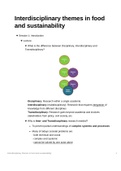Summary
Samenvatting Interdisciplinary Themes In Food And Sustainability (YSS33806)
- Course
- Institution
This document summarizes the lectures, guest lectures and articles in the course Interdisciplinary Themes In Food And Sustainability (YSS33806).
[Show more]



